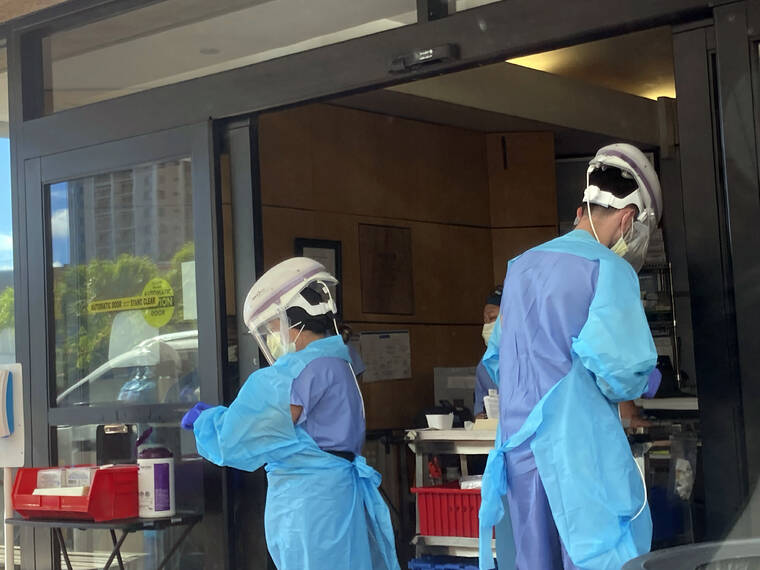HONOLULU — Hawaii reported 1,511 new coronavirus cases Thursday as state officials say the omicron variant is likely spreading widely throughout the islands.
Hawaii’s single-day record of 1,678 cases was recorded at the height of the delta surge at the end of August.
The new case count is the latest in a week of high infection numbers for the state, which had been averaging about 100 daily cases in early December.
Hawaii has had among the most rapid increases in new COVID-19 cases nationally over the past 14 days, according to data sourced from Johns Hopkins University.
Hawaii Department of Health Director Dr. Libby Char said at a news conference Thursday that people need to get vaccinated, noting that more than 370,000 Hawaii residents have not gotten their shots.
She also said the state has a low rate of people getting boosters, but emphasized that the additional protection is critical for flattening the curve.
“I’m not sure why it’s so low and we’re trying to figure that out,” Char said. “People just have a sense that two shots is enough.”
Dr. Rochelle Walensky, the director of the U.S. Centers for Disease Control and Prevention, said last week that data suggests omicron is more transmissible than the delta variant.
Given that, full vaccination “really should be a three-shot series,” Char said.
The state has a test positivity rate of around 8% and the most populous island of Oahu has a positivity rate over 10%, Char said.
The first confirmed case of the omicron variant in Hawaii was announced on Dec. 2. As of Wednesday, there were least 74 confirmed omicron cases.
Hawaii, with a population of about 1.5 million people, has had more than 600,000 travelers in December, according to the Hawaii Tourism Authority.
Hawaii requires travelers to be vaccinated or provide a negative coronavirus test taken within 72 hours before arrival, or face a 10-day quarantine.
Char said state officials are discussing the possibility of requiring a booster shot to avoid travel quarantine or testing as well possibly shortening the window allowed for obtaining a negative test, but no changes have yet been made.
“The public health recommendation would be you test as close to flying time as possible and you have your immunizations plus your booster shot,” Char said. “But understand that there are challenges in implementing that.”
The state previously required all travelers to get tested before they arrived to avoid quarantine, but lifted that mandate as vaccines became more widely available.
“If you can avoid travel right now, avoid travel right now,” Char said. “Don’t put yourself in those situations.”
The U.S. now requires international travelers to test within 24 hours of their trip, regardless of nationality or vaccination status.
While the confirmed cases of omicron have so far all been on Oahu, other islands expect the variant has already arrived. Char said health officials are investigating suspected omicron cases on Maui and the Big Island.
Big Island Mayor Mitch Roth warned people to be careful over the holidays and said to avoid large gatherings, especially indoors.
“We don’t want anyone to miss out on time spent with friends, family, and loved ones,” Roth said in a statement. “After all, that’s what the holidays are all about. However, we are asking that folks spend time in a way that is safe and protects the ones we love and others in our community.”
He suggested that people swap out hugs and traditional Hawaiian greetings for fist bumps and shakas.
“Our island is special because everyone cares for everyone, and that is how we have made it through the pandemic thus far, and it’s how we will make it through moving forward,” Roth said.
There are no confirmed omicron cases on Kauai, but the island has seen a spike in new infections.
“With this rapid rise in cases, we can assume that the omicron variant is on Kauai,” said the state Department of Health’s district officer for Kauai, Dr. Janet Berreman, in a statement.
Island mayors have not made any changes to current coronavirus restrictions, most of which were lifted in early December.
“We’re not going to impose anymore restrictions,” said Honolulu Mayor Rick Blangiardi, who said the island’s vaccination and testing policy for businesses and events is sufficient. “It’s about making good decisions, so it’s about personal responsibility. Don’t go to someplace if you fear that it’s going to be something that would make you sick. But if you do go and you’re indoors, wear your mask.”
Blangiardi recently allowed bars and large indoor events to resume. There have been clusters of cases at two of Honolulu’s largest nightclubs in recent weeks. Masks are not required while eating or drinking and occupancy limits with distancing rules have been removed.
The state also reported a recent cluster at an event at the Hilton Hawaiian Village in Waikiki.





